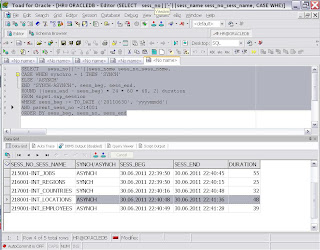In data warehouse designing, an important step is to deciding which step is before/after. Newly added packages and required DW data must be analyzed carefully. Synchronous addings can lengthen ETL duration.
Interfaces, procedures without generated scenario cannot be executed in parallel. Only scenario executions can be parallel in ODI. Default scenario execution is synch in ODI. If you want to set a scenario to executed in parallel then you will write “-SYNC_MODE=2″ on command tab or select Synchronous / Asynchronous option Asynchronous in General tab.
I have created a package as interfaces executes as;
- INT_JOBS parallel
- INT_REGIONS synch
- INT_REGIONS synch
- INT_COUNTRIES synch
- INT_LOCATIONS parallel
- INT_EMPLOYEES parallel
SELECT sess_no || '-' || sess_name sess_no_sess_name,
CASE
WHEN synchro = 1
THEN 'SYNCH'
ELSE 'ASYNCH'
END "SYNCH/ASYNCH", sess_beg, sess_end,
ROUND ((sess_end - sess_beg) * 24 * 60 * 60, 2) DURATION
FROM snpw1.snp_session
WHERE sess_beg >= TO_DATE ('20110630', 'yyyymmdd') AND sess_no > 214001
ORDER BY sess_beg, sess_no, sess_end;
- Sess_no 215001, 216001, 217001 duration: 58 secs
- Sess_no 218001, 219001 duration: 48 secs
SELECT parent_sess_no, MIN (sess_beg), MAX (sess_end),
ROUND ((MAX (sess_end) - MIN (sess_beg)) * 24 * 60 * 60, 2) sess_dur
FROM snpw1.snp_session
WHERE sess_beg >= TO_DATE ('20110630', 'yyyymmdd')
AND parent_sess_no = 214001
GROUP BY parent_sess_no
PARENT_SESS_NO MIN(SESS_BEG) MAX(SESS_END) SESS_DUR214001 30.06.2011 22:39:50 30.06.2011 22:41:36 106
In this case, when first scenario execution is finished, package execution status will show you done. But other scenarios is still executing, so you can add ODI WAIT FOR CHILD SESSION (OWFCS) in the end of package to see status is done when all scenarios are finished executing. Add OdiWaitForChildSession with “-POLL_INT=1″ “-MAX_CHILD_ERROR=1″ options. Also if one of scenarios will be fail, you will get package error with this case.
After OWFCS, you can see first group execution is done, then, second group is executing.
SELECT sess_no || '-' || sess_name sess_no_sess_name,
CASE
WHEN synchro = 1
THEN 'SYNCH'
ELSE 'ASYNCH'
END "SYNCH/ASYNCH", sess_beg, sess_end,
ROUND ((sess_end - sess_beg) * 24 * 60 * 60, 2) DURATION
FROM snpw1.snp_session
WHERE sess_beg >= TO_DATE ('20110630', 'yyyymmdd') AND sess_no > 214001
SELECT parent_sess_no, MIN (sess_beg), MAX (sess_end),
ROUND ((MAX (sess_end) - MIN (sess_beg)) * 24 * 60 * 60, 2) sess_dur
FROM snpw1.snp_session
WHERE sess_beg >= TO_DATE ('20110630', 'yyyymmdd')
AND parent_sess_no = 264001
GROUP BY parent_sess_no
PARENT_SESS_NO MIN(SESS_BEG) MAX(SESS_END) SESS_DUR
264001 04.07.2011 23:10:27 04.07.2011 23:13:41 194




Comments
Post a Comment